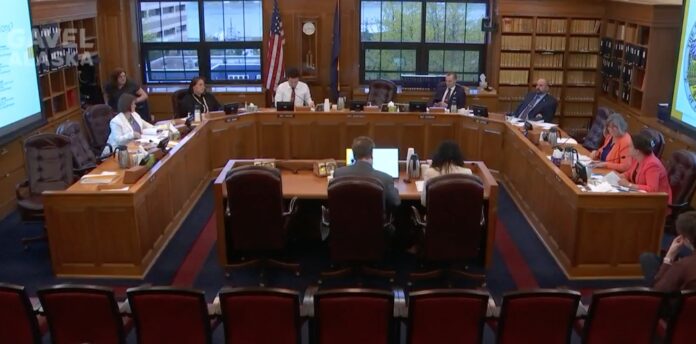Senate Bill 64, a contentious piece of legislation aimed at eroding the integrity of Alaska’s election laws, failed to advance out of the House Finance Committee this session following strong public outcry and unified resistance from House Republicans.
The bill, championed by Senate Democrats, faced intense scrutiny during a flurry of legislative activity in recent weeks. Alaskans from across the state submitted public testimony, written comments, and direct appeals to lawmakers, expressing concerns that the bill’s provisions would diminish — not enhance — election security in a state that already has a reputation for lax election security.
Among the most debated elements of SB 64 were proposals to eliminate the witness signature requirement for absentee ballots, create a permanent absentee voter list, expand ballot collection and harvesting practices, and authorize widespread use of unsecured ballot drop boxes.
House Republicans argued that these measures would significantly weaken existing safeguards designed to ensure voter identity and ballot integrity.
“Election integrity is a very real issue,” said Rep. DeLena Johnson of Palmer. “Judging from the number of Alaskans making their voices heard over the past several days, this issue needs much further assessment and better solutions than SB 64 can provide.”
Rep. Jamie Allard of Eagle River offered a sharp rebuke of the bill: “This bill greases the skids for all mail-in elections like Anchorage has. SB 64 is the biggest hoax that the Democrats have promulgated so far this year — and that is saying a lot since there are some other bills that are contenders.”
Critics also emphasized the rushed timeline of the legislation.
“Rushing a nonpartisan bill through at the last minute isn’t how the legislative process is meant to work,” said Rep. Frank Tomaszewski of Fairbanks. “I’m glad we’ll have the chance to take a closer look at SB 64 next year.”
Beyond procedural concerns, opponents also saw the bill as a partisan attempt to institutionalize policies that would benefit one side of the aisle.
“Instead of focusing on commonsense improvements that both sides could support, Democrats insisted on packing the bill with their full wish list—including permanent vote-by-mail, unlimited ballot drop boxes, and the elimination of witness signatures,” said Rep. Sarah Vance of Homer.
Longtime political figure and election expert Randy Ruedrich also submitted a formal statement to the House Finance Committee on May 15, warning that SB 64 lays the groundwork for statewide mail-in voting systems similar to those already adopted by the Municipality of Anchorage, a point made by Rep. Allard as well.
“Mail-in voting has been found to create significant voter fraud in other states,” Ruedrich stated. “The bill would establish permanent absentee-by-mail ballot distribution, which sends an absentee ballot to a voter’s old temporary address. As long as these ballots are returned, the state must continue sending ballots to that address — potentially to unauthorized agents.”
He also highlighted the removal of the witness signature requirement as a dangerous step.
“The witness signature affirms the identity of the voter,” he said. “Democrats say the witness signature is inconvenient. Well, so are voter ID, voter registration, and voting itself.”
Ruedrich further criticized the bill’s impact on military voters and other Alaskans temporarily out of state, arguing that SB 64 would “destroy the Alaska right to vote” for those who can’t return to their prior physical residences, such as military personnel or students.
“This Democrat ploy will eliminate our registered enlisted personnel who have viewed Alaska as their only home during decades-long military careers,” he said.
While the bill is now effectively on hold, House Republicans have emphasized their commitment to secure and transparent elections. The Republican caucus pledged to continue working on election reform measures that have broad public support and that maintain voter trust.
The bill’s prime sponsor, Sen. Bill Wielechowski of Anchorage, will push the bill forward in 2026, but has lost his quest to enact the fraud-enhancement changes to Alaska’s election laws prior to the 2026 election.
